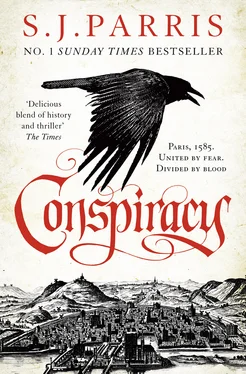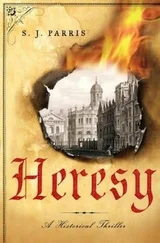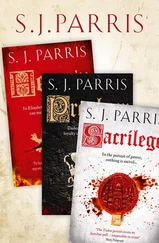‘I will have it for you very soon, I swear. I just need to – get my affairs in order. Any day now.’ By which I meant, whenever the King deigns to send for me.
‘Ah, I’m only messing, lad – go on, what’ll you have? Put some meat on your bones. You look hungry.’
‘Thank you – perhaps later.’
‘You say that to all the girls,’ he called after me as I ducked between wildly gesturing students to escape, smiling to myself at the way he still thought of me as one of his boys, though at thirty-seven I was probably only a few years behind him. At least the whores and publicans of Paris were pleased to see me back.
The buildings took on a greyish pallor in the deepening shadows as the rain fell harder. The days were shortening towards midwinter; when the sky was overcast it felt as if night was falling by early afternoon. I wrapped my cloak around my shoulders and pulled the hood close to hide my face as I trudged back towards the river through rutted streets ankle-deep in filth. At the corner of rue Saint-Jacques, I felt a hand reach out and clutch at my sleeve; I whipped around, dagger half-drawn, but it was only a beggar-child, filthy and hollow-cheeked, with staring eyes. I would have thrown him a coin, but he caught sight of the knife and streaked away into an impossible gap between two houses quick as a fish. Paris was full of the dispossessed now; that was another change for the worse. Failing harvests and the constant three-way skirmishes between the Protestant Huguenot forces, the beleaguered royal armies and the swelling numbers of Catholic League troops further south had driven bedraggled flocks of refugees towards the capital, where they begged, stole, sold themselves, or starved to death on the streets.
It was growing harder to resist the melancholy that had crept over me since my enforced return from London. In Paris, as the chill and dark of autumn edged towards winter, I had begun to experience a gnawing homesickness for the blue skies and green slopes of my native Nola, at the foot of Mount Vesuvius, made keener by the knowledge that I might never return. For perhaps the first time since I had abandoned the religious life nine years ago, I was truly coming to understand what exile meant. This rootlessness – living out of a travelling bag, arriving in every town with one eye on the road out – no longer felt like freedom. Now, more than ever, it felt like the reverse. I had thought, for a while, that I might come to call London home, but that did not work out as I had hoped. I had left behind the few people I thought of as friends, and arrived in Paris to find those who had once opened their doors to me turning away, embarrassed. My reputation was becoming a problem, one I entrenched further with each new book I wilfully published. Though every fibre of my being bridled at the forced humiliation, I had no choice but to beg to have this excommunication lifted. At twenty-eight, I had worn it as the proud badge of a free-thinker. Now, at thirty-seven, I was obliged to view it in a different light: as an impediment to any offer of patronage. A man like me could not live without a patron, and no Catholic with a care for his honour will sponsor a known heretic; it was for this alone that I had approached Paul. For now, I belonged nowhere, and it was hard to shake that sense of exclusion.
I clenched my teeth and sheathed my dagger: no more of that. Courage, Bruno, I told myself, as I walked on towards the rue Macon. You have been in worse straits than this and talked your way out and up; you can do so again. I needed to see Jacopo Corbinelli. But first, I had to make sure I could not be further connected with Paul Lefèvre. If he had been carrying letters, they must have been taken from him before he was thrown in the river, but his lodgings would certainly be searched; if there was any correspondence that mentioned me or the favour I had asked of him, I wanted to be the one to find it. I knew too well how it might be used against me. There were those among the extreme Catholic faction here in Paris who knew, or guessed at, my activities in England. If they thought I desired the Church’s goodwill again, they would not miss the chance to use it as leverage. Reconciliation in exchange for information – and that was a bargain I was not prepared to strike. I still felt some loyalty to England, even if she appeared to have forgotten me. Beyond that, I had no intention of involving myself in Paul’s murder. We had been acquaintances, not friends; I was sorry that he had met such a brutal death, but he would have known he was courting danger when he decided to tangle with religious politics. Besides, I had a good idea that the cynical Frère Albaric had not been far wrong in his surmise about the Louvre, and that was a truth I preferred to leave for others to uncover.
Halfway along rue Macon I met a young woman with a basket of laundry sheltering in a doorway; after we had exchanged complaints about the weather, she confirmed that Père Lefèvre did indeed have rooms in a house opposite, on the first floor. I considered knocking to see if one of his neighbours would let me in, but there were no lights visible in the rest of the house, and it seemed wise to keep my visit discreet. A little careful tinkering with the blade of my knife, and the cheap lock of the front door yielded without much resistance. I latched it behind me, so that I would at least have some warning if someone else had the same idea.
It took a moment for my eyes to adjust to the gloom of the entrance hall, and I wished I had thought to bring a tinder-box and taper. On my left, a crooked staircase ran up to the first floor; after listening for any tell-tale sound of movement from other rooms, I climbed as carefully as I could, though it was impossible to stop the old boards from groaning in protest. My stomach let out a low growl and I clamped a hand across it as if that might muffle the sound; I regretted turning down Gaston’s offer of supper. The door to Paul’s rooms was also locked, and took longer to tease into compliance; this lock appeared newly fitted, and was of a more sturdy and sophisticated type than the rusted bolt downstairs. Had he installed it out of fear for his own safety, I wondered, or to protect some item of value inside? My fingers had grown stiff with cold; I breathed on them and reminded myself to be patient – a steady hand was vital in the series of minute movements required to persuade a lock to yield without a key. Too much haste and you would break the mechanism or slice your fingers. A strange skill for a philosopher, my friend Philip Sidney used to say, though always in a tone of admiration – but then Sidney found it hard to imagine the life I had led before I met him. As the son of a noble family, he had been taught to duel as a boy by a celebrated fencing master; I had learned to fight with my fists on the streets of Naples. I picked up additional skills not usually taught to Dominican friars during the two years I spent on the road north through Italy after I abandoned my order: passing nights in barns, or in taverns where men will put a knife in your ribs for a heel of bread, you learn to shift for yourself however you can. My fellow travellers in those years were not aristocrats and poets but criminals, charlatans and itinerants: strolling players, card sharps, defrocked priests, pedlars, jongleurs, whores and heretics. They knew a few tricks about how to survive, and were generous enough to pass them on. I thanked them silently as the lock finally submitted to the point of my knife with a gratifying click.
Paul had liked his surroundings austere; I almost smiled at the painstaking self-denial in evidence as I closed the door behind me. The room smelled of woodsmoke, damp and that stale odour of unwashed clothes that often clings to bachelors. I felt a stab of pity for him; he had allowed himself so little joy in his determination to please God, and look what it had brought him. Perhaps that was the saddest aspect of his death; he had never been a man who cared much for worldly advancement. If he had joined the Catholic League – those hardline religious conservatives determined to restore the purity of the Church, at any cost – it would have been from a genuine zeal to purge France of all that was unholy. Mind you, that was what the Inquisition in my country liked to claim too.
Читать дальше












